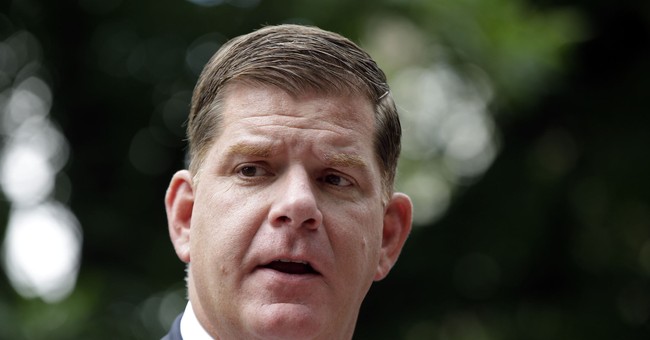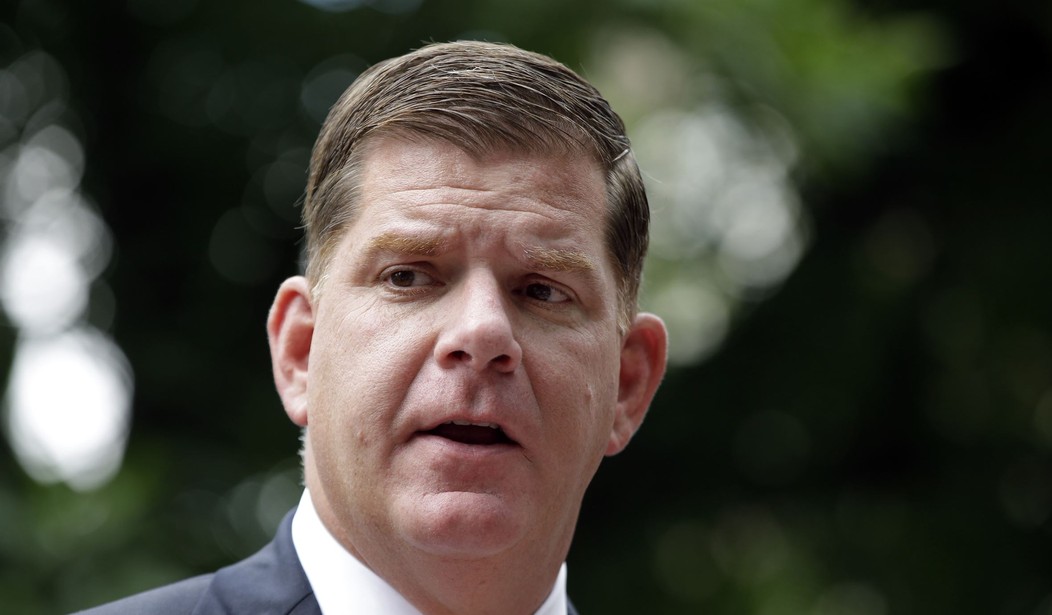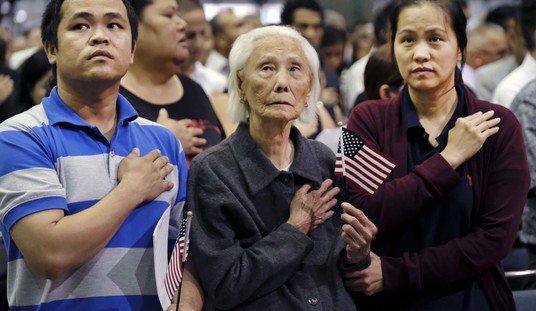
About a month into our nation’s collective quarantine, and after witnessing an unending parade of overreaching government edicts issued by socialist democrat elected officials who claimed the public health emergency granted them such authority, I came to a frightening realization: Democrats will use the declaration of a public health emergency or crisis to enact all of the terrible policies they can’t pass legislatively.
Unfortunately, it’s already starting. Though we’re still (allegedly) in the midst of the Wuhan “Kung” Flu public health crisis, Boston Mayor Marty Walsh has declared another public health crisis in Beantown – that of racism.
In a press conference Friday Walsh announced the issuance of an Executive Order making the declaration and (shocker) using the authority granted by way of the declaration to divert $3 million (for starters) from the Boston Police Department’s overtime pay fund to the Boston Public Health Commission to fight the crisis.
Today I am declaring racism a public health crisis in the @CityofBoston. The health impacts of historic and systemic racism are clear in our #COVID19 case numbers, and the impacts go far beyond the current crisis. pic.twitter.com/KO18NKMnjC
— Mayor Marty Walsh (@marty_walsh) June 12, 2020
The declaration was necessary, Walsh said, because:
“The health impacts of historic and systemic racism are clear in our COVID-19 case numbers, and the impacts go far beyond this current crisis.
“The health commission will work with our city’s departments, including our police department, on strategies to directly assess any impacts racism has on the lives and the health of Boston residents.”
Far more than the initial $3 million will be needed, according to the city’s Office of Health and Human Services Chief Marty Martinez, who recommends taking an additional $9 million from the BPD’s 2021 overtime pay fund. Here’s how that money would be spent:
$1 million to support trauma response and counseling at the Boston Public Health Commission, $2 million to other city departments including violence prevention, food security, immigrant advancement, elder support, $2 million for programming supporting minority- and women-owned businesses, $2 million for housing security and ending youth homelessness and $2 million for emergency clinicians and mental support for the Boston Police Department when responding to crises.
And that’s just for one year.
Martinez elaborated a bit on city health officials’ starting point.
The Public Health Commission will work with the Department of Health and Human Services to enact policy and practical solutions, aiming to get to the root cause of inequities and pledging to engage underserved communities in discussions. That starts with releasing complete and regularly available data that documents health inequities, developing direct service programs to address inequities, and joining state and national advocacy groups pushing to identify new policies and funding opportunities to combat systemic racism.
Among the direct service programs is Boston Health Equity Now, developed to address root causes of inequities. The BPHC will release a plan for Boston Health Equity Now in 120 days. There will also be an annual report on the plan’s progress, starting in 2021.
This is a confusing starting point given that former Boston Public Health Commission Director Barbara Ferrer claims (emphasis added):
“[H]er favorite achievement during her 13-year tenure at BPHC was aggressively tackling health inequity in Boston, specifically on chlamydia, obesity and child mortality rates.
Narrowing the gap between white and back populations facing those issues “meant lots and lots of people doing very difficult work,” she said.
“We’re really proud that we’ve identified places where we could work to close the gap. And we’re starting to see that gap close,” Ferrer said.
“How is it possible, in a city like Boston with world-class hospitals and teaching facilities, and near-universal health coverage, how is it possible that black residents live less years than whites and face higher rates of disease?” she said. “It’s not linked to personal choices.”
Her team had to focus on the conditions in which people live their lives and what are the conditions that promote good health.
“We’ve done a lot of training. It’s a big system change, and a lot of credit goes to the people in that system who can pivot and shift,” she said.
“The most important thing now is creating the conditions through which the residents, workers and guests of the city will have resources they need for optimal health.”
In addition, the Massachusetts Public Health Association wrote, “In her 25+ years in the Massachusetts public health community she has spearheaded numerous campaigns and programs to combat health inequities and disparities,” and that one of her major successes at BHPC was “Creating a broad-based and comprehensive campaign to reduce racial and ethnic health disparities.”
Ferrer is also a “nationally‐known public health leader with over 30 years of professional experience….She has a proven track record of working collaboratively to improve population outcomes through efforts that build health and education equity,” according to her LA County Department of Public Health bio.
Why, then, are disparities in health equity by race such a problem in Boston? Was the relevant data not collected and shared with the public? Were there no metrics by which Ferrer was judged? Did she not pledge to and actually engage underserved communities in conversation?
And, by golly, how could she not get to the “root causes of inequities” after being there for 13 years and spending millions of dollars?
It’s as if they wanted to spend taxpayer dollars to sit around and postulate and pontificate and never really do anything.
(Read more about Dr. Ferrer’s botched handling of the coronavirus pandemic in Los Angeles here, and about her activist background here.)
But, there’s a potential silver lining to Boston’s “racism is a public health crisis” order. According to Boston Police Commissioner William Gross, the changes will allow officers to focus on law enforcement duties. He said (emphasis added):
“Quite frankly, what I’ve heard in the community is we wear too many hats anyway,” Gross said. ” A child doesn’t want to go to school? You call the Boston police. A child’s on the bus being unruly? You call the Boston police. There’s an emotionally disturbed person in a home? You call the Boston police. How many hats do you want us to wear?“
In all likelihood, though, when bureaucrats from BHPC and the DHHS fail to achieve their goals, they’ll still blame the police department.
Boston wasn’t the first city to declare racism as a public health crisis following the murder of George Floyd; the suburban towns of Medford and Somerville made such declarations in the last week. Milwaukee was the first city in the United States to declare racism as a public health crisis back in May, 2019.














Join the conversation as a VIP Member